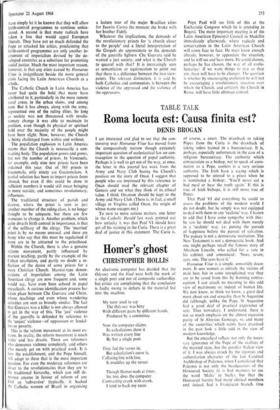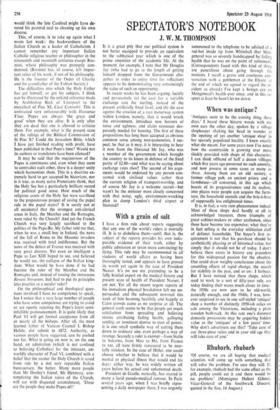Roma locuta est: Causa finita est?
TABLE TALK DENIS BROGAN
I am interested and glad to see that the con- troversy over Humanae Vitae has moved from the comparatively narrow though extremely important question of ecclesiastical law on con- traception to the question of papal authority. Perhaps it is well to get out of the way, at once, the letter in this journal last week from the Army and Navy Club basing the Church's position on the story of Onan. I suggest that people who are impressed by this reference to Orlin should read the relevant chapter of Genesis and see what they think of its ethical value. I think Onanism should be kept to the Army and Navy Club. (There is, in fact, a small village in Virginia called Onan, the origin of whose name escapes me.) To turn to more serious matters, one letter in the Catholic Herald last week pointed out how unlucky it was that Paul VI should have got all his training in the Curia. There is a great deal of justice in this statement. The Curia is,
of course, a court. The drawback to taking Popes from the Curia is the drawback of taking rulers trained in a bureaucracy. It is, perhaps, especially unfortunate in the case of a religious bureaucracy. The authority which consecration as a bishop, not to speak of coro- nation as a Pope, confers is a very serious authority. The Irish have a saying which is supposed to be uttered to a priest when he is nominated a bishop: 'You'll never eat a bad meal or hear the truth again.' If this is true of Irish bishops, it is still more true of Popes.
That Paul VI did everything he could to assess the problems of the modern world I do not doubt, but he simply was not equipped to deal with them in any 'realistic' way. I hasten to add that I have some sympathy with this: he saw he should not deal with them merely in a 'realistic' way, i.e. putting the pursuit of happiness before the pursuit of salvation. The papacy is not a democratic institution. The New Testament is not a democratic book. And one might perhaps recall the famous story of Abraham Lincoln, who called for a vote in his cabinet, and announced : 'Noes, seven; ayes, one. The ayes have it.'
Humanae Vitae is a simple, unworldly docu- ment. It sees women as entirely the victims of male lust; but in some unexplained way they are to be saved from this by banning contra- ception. I can attach no meaning to this odd view of matrimony or, indeed, of human life. We now know, or think we know, a great deal more about sex and sexuality than St Augustine did (although, unlike the Pope, St Augustine had a good deal of practical experience of sex). Thus nowadays, I understand, there is not so much emphasis on the almost excessive purity of St Aloysius Gonzaga, SJ, and many of the austerities which saints have practised in the past look a little odd in the view of modern knowledge.
But the encyclical reflects not only the neces- sary ignorance of the Pope of the realities of the married state, but the peculiar Italian view of it. I was always struck by the rigorous and authoritarian character of the late Cardinal Archbishop of Palermo, when i considered that Palermo is not only the headquarters of the Honoured Society (it is bad manners to use the word 'Mafia' in Sicily), but that the Honoured Society had many clerical members and, indeed, had a Franciscan branch. One would think the late Cardinal might have de- voted his pastoral zeal to cleaning up his own diocese.
This, of course, is to take up again what I wrote last week: the backwardness of the Italian Church as a leader of Catholicism. I cannot remember any important Italian Catholic religious teacher or philosopher in the nineteenth and twentieth centuries except Ros- mini, whose philosophy was promptly con- demned. (Rosmini has, of course, left impor- tant relics of his work, if not of his philosophy. He is the founder of the Order of Charity and the grandfather of the Fabian Society.) The difficulties into which the Holy Father has got himself, or got his subjects, I think can be illustrated by the unkind reference made by Archbishop Beck of Liverpool to the encyclical of Pius XI, Casti Connubii. This is contrasted very unfavourably with Huntanae Vitae. Popes are always 'the great and good' when they are alive. It is only after they are dead that one is allowed to criticise them. For example, what is the present state of the rulings of the Biblical Commission of St Pius X? Could the Jerusalem Bible, which I have just finished reading with profit, have been published in that Pope's time? Would not its authors or translators have been silenced?
It may be said that the magisterium of the Popes is continuous and, even when they seem to contradict each other, there is a deeper unity which harmonises them. This is a doctrine ex- tremely hard to get accepted by historians, nor is it true, as many naive Protestants think, that the Holy See has a particularly brilliant record for political good sense. How much of the religious assets of the Holy See were sacrificed to the preposterous project of saving the papal rule in the papal states? It is surely not at all accidental that the strongest anti-clerical areas in Italy, the Marches and the Romagna, were ruled by the Church? And yet the French Church was very largely sacrificed to the politics of the Papa-Re. My father told me that, when he was a small boy in Ireland, the news of the fall of Rome to the Masonic invaders was received with total indifference. But the news of the defeat of France was received with very great distress. Yet even so intelligent a Pope as Leo XIII hoped to see, and believed he would see, the collapse of the Italian king- dom. What would he have done if he had become the ruler of the Marches and the Romagna and, instead of issuing the innocuous Rerum Novarunt, had had to put its principles into practice as a secular ruler?
On the philosophical and theological ques- tions involved I have no competence to speak, but I notice that a very large number of people who have some competence are trying to avoid or are openly rejecting the Pope's latest semi- infallible pronouncement. It is quite likely that Paul VI will get formal acceptance from all or nearly all the bishops. After all, the most learned father of Vatican Council I, Bishop Hefele, did submit in 1872. Authority, as various people have suggested, can be pushed too far. What is going on now is, on the one hand, an admiration (which is not confined to believing Catholics) for the innocent, un- worldly character of Paul VI, combined with a belief that the sooner the Holy Church is saved from rule by a not very reputable Italian bureaucracy, the better. Many more people than Mr Dooley's friend, Mr Hennessy, con- templating the Italian rulers of the Church, will say with disgusted astonishment, 'These are the people they make Popes of 1'



































 Previous page
Previous page